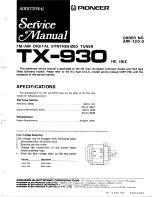
PAGE 24
THE LDG AT-1000PROII
In 1995, LDG Electronics pioneered a new type of automatic antenna tuner. The LDG design
uses banks of fixed capacitors and inductors, switched in and out of the circuit by relays under
microprocessor control. An additional relay switches between high and low impedance ranges. A
built-in SWR sensor provides feedback; the microprocessor searches the capacitor and inductor
banks, seeking the lowest possible SWR. The tuner is a “Switched L” network, consisting of
series inductors and parallel capacitors. LDG chose the L network for its minimum number of
parts and its ability to tune unbalanced loads, such as coax-fed dipoles, verticals, Yagis, and, in
fact, virtually any coax-fed antenna.
The series inductors are switched in and out of the circuit, and the parallel capacitors are
switched to ground under microprocessor control. The high/low impedance relay switches the
capacitor bank either to the transmitter side of the inductor bank, or to the antenna side. This
allows the AT-1000ProII to handle loads that are either greater than or less than 50 ohms. All
relays are sized to carry 1000 watts continuously. The relays are non-latching, so power is
required to “hold” the current match.
The SWR sensor is a variation of the Bruene circuit. This SWR measuring technique is used
in most dual-meter and direct-reading SWR meters. Slight modifications were made to the circuit
to provide voltages instead of currents for the analog-to-digital converters that provide signals
proportional to the forward and reflected power levels. The single-lead primary through the
center of the sensor transformer provides RF current sampling. Diodes rectify the sample and
provide a DC voltage proportional to RF power. These two voltages are read by the ADCs in the
microprocessor, and are used to compute SWR in real time.
Although the microprocessor’s oscillator runs at 32 MHz, which allows the main tuning
routine to execute in only a few milliseconds, the relays require several milliseconds of settling
time for every combination of inductors and capacitors. Thus, it may take several seconds before
all relay combinations are exhausted, in the case of a difficult tune.
The tuning routine uses an algorithm to minimize the number of tuner adjustments. The
routine first de-energizes the high/low impedance relay if necessary, then individually steps
through the inductors to find a coarse match. With the best inductor selected, the tuner then steps
through the individual capacitors to find the best coarse match. If no match is found, the routine
repeats the coarse tuning with the high/low impedance relay energized. The routine then fine
tunes the inductors and capacitors. The program checks LC combinations to see if a 1.5:1 or
lower SWR can be obtained, and stops when it finds a good match.
The microprocessor runs a fine tune routine just after the tuner finds a match of 1.5:1 or less.
This fine tune routine now tries to make the SWR as low as possible (not just to 1.5); it takes
about half a second to run.
Summary of Contents for AT-1000PROII
Page 8: ...PAGE 8...





































